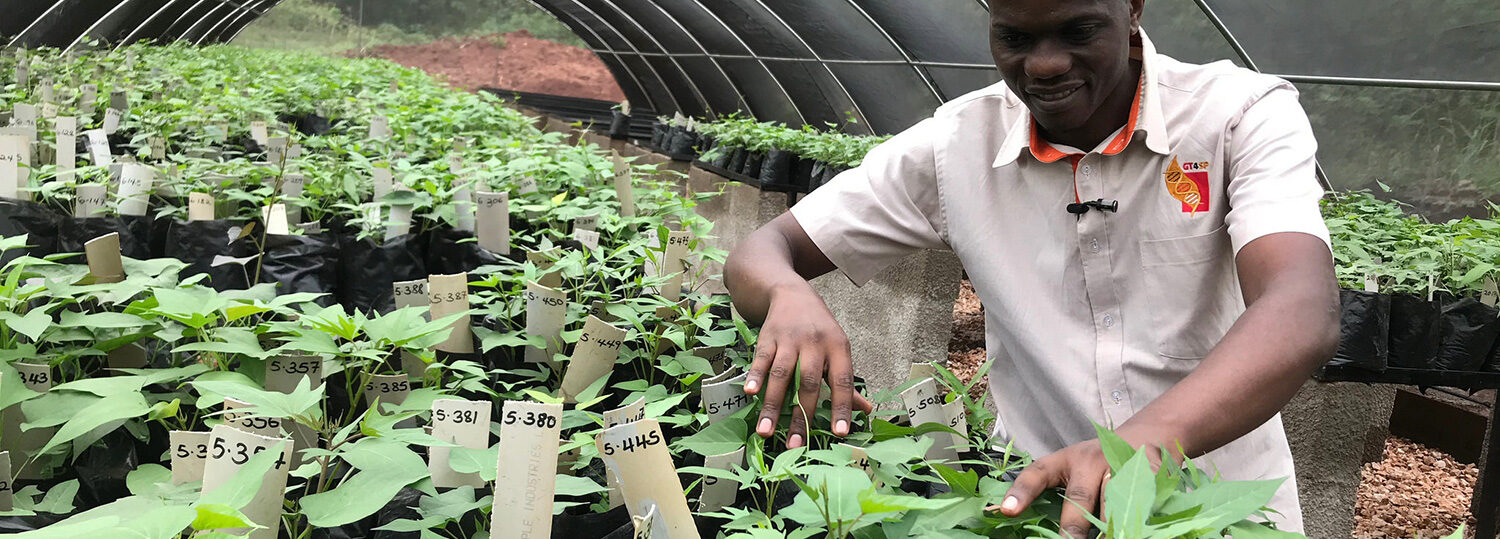Scientists from the International Potato Center (CIP) and NC State Genomic Tools for Sweetpotato (GT4SP) are part of an exciting venture that is working to develop a set of “next-generation” tools for African sweetpotato breeders. Those tools will help breeders develop more resilient, nutritious and high-yielding sweetpotato varieties more quickly, in order to keep up with the challenges of climate change.
Sweetpotato already contributes to food, nutrition and income security in millions of households across sub-Saharan Africa (SSA), but it has the potential to benefit millions more. Under the Genomic Tools for Sweetpotato (GT4SP) improvement project – supported by the Bill & Melinda Gates Foundation through its partnership with North Carolina (NC) State University – CIP is collaborating with various institutions to harness the pro-poor potential of sweetpotato through a better understanding of its genome – the complete set of genes responsible for an organism’s characteristics.
Because it is polyploid—possessing more than two complete sets of chromosomes— sweetpotato genomics is challenging, and its application to breeding is consequently several steps behind that of many other crops. GT4SP scientists are working to enable the use genomics-assisted (genomics-guided) breeding to accelerate and enhance the development of more productive sweetpotato varieties that meet the needs of farmers and consumers.
Members of the GT4SP team recently participated in the Plant and Animal Genome XXVII Conference (PAG)—the largest agricultural genomics meeting in the world. This year’s PAG drew more than 3,000 leading genetic scientists and plant and animal researchers to San Diego, California from January 12 to 16. A CIP-organized sweetpotato workshop at PAG on January 16 brought together multidisciplinary teams that shared and discussed current progress in genomic studies in sweetpotato and the potential for improving the speed and efficiency of sweetpotato breeding, especially in the developing world.

Members of the GT4SP team in the (sweetpotato) field.
The January 16 workshop included presentations on research done by CIP and various partners in the GT4SP project, as well as the work of the Trilateral Research Association of Sweetpotato (TRAS), in Japan, China and Korea, which was represented by Dr. Sachiko Isobe. Presentations on recent advances in sweetpotato genomics were given by Dr. Bode Olukolu, of the University of Tennessee, Dr. Kin Lau, of Michigan State University and Dr. Benard Yada, of Uganda’s National Crops Resources Research Institute (NaCRRI).
One of the highlights was the presentation on the recently published genome sequences of two diploid wild relatives of cultivated sweetpotato – an effort that several CIP scientists contributed to. They represent the first reference genomes for sweetpotato and are available for use by the global sweetpotato breeding community.
CIP scientist Dr. Mercy Kitavi also presented results of a genome-wide association study done by Astere Bararyenya, a PhD student working under the GT4SP capacity building component. She concentrated on the identification of markers for genes associated with continuous storage root formation and bulking, which can enable piece-meal harvesting of sweetpotato roots. This would allow subsistence farmers to harvest the crop over time, providing their families with a longer-term supply of nutritious food.
The workshop, and PAG conference in general, provided excellent opportunities for scientists to exchange ideas and applications, present research advances, and meet potential new collaborators. For example, the GT4SP team met with companies offering genomic solutions to crops with complex genetics. Access to such tools and knowledge will, in the long run, enhance breeders’ ability to develop resilient sweetpotato varieties that enable smallholder farmers in Africa and beyond to produce enough nutritious, marketable food while adapting the challenges posed by climate change.
The GT4SP is led by NC State University in collaboration with CIP, the Boyce Thompson Institute at Cornell University; Michigan State University; the University of Queensland-Brisbane, Australia; the Uganda National Agricultural Research Organization, National Crops Resources Research Institute; and the Ghana Council for Scientific and Industrial Research, at the Crops Research Institute.
by Mercy Kitavi and Dorcus Gemenet

